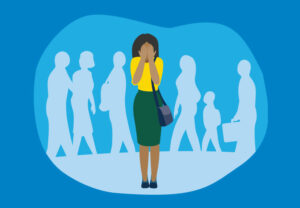Do you avoid social situations because you’re afraid of what people will think of you? Do you feel like you can’t control your anxiety in social settings? If so, then you may be suffering from social phobia. This condition can be very debilitating, but there are treatments available that can help. In this blog post, we will discuss 11 effective social phobia treatment options.
Contents
Understanding Social Phobia
 Social phobias are a type of anxiety disorder that involve intense fear and avoidance of certain social situations. People with social phobia may experience extreme discomfort when interacting with strangers, attending parties, or other gatherings, or being observed by others while performing activities. They may also avoid speaking in public or participating in group activities.
Social phobias are a type of anxiety disorder that involve intense fear and avoidance of certain social situations. People with social phobia may experience extreme discomfort when interacting with strangers, attending parties, or other gatherings, or being observed by others while performing activities. They may also avoid speaking in public or participating in group activities.
Common symptoms of social phobia include:
- feelings of intense anxiety or fear
- rapid heartbeat and breathing
- sweating
- trembling
- choking sensation
- nausea
- difficulty speaking
People with social phobia may also experience other physical symptoms such as blushing or a flushed face. Therefore, it is important to understand the potential physical and emotional symptoms of social phobia in order to seek help.
Top 11 Social Phobia Treatment Options
The following are the top 11 social phobia treatment options that may be helpful to individuals suffering from social anxiety disorder:
Cognitive Behavioral Therapy (CBT)
CBT is a form of psychotherapy that helps individuals recognize and challenge the irrational thoughts and beliefs that cause their feelings of anxiety. It is a collaborative process between the patient and therapist, with an emphasis on practical solutions. A therapist works with the patient to identify and modify irrational beliefs, fear-producing thinking patterns, and extreme anxiety responses.
Exposure therapy
Through exposure therapy, individuals gradually confront triggering situations in order to increase their confidence and reduce their fear. There are two major forms of exposure therapy: in vivo, or direct experience with the feared situation, and imaginal exposure, wherein patients imagine themselves confronting their fear. Both are effective in reducing the severity of social anxiety symptoms.
Mindfulness-based therapies
This is one of the most widely successful social phobia treatment options available. Mindfulness-based therapies help individuals learn to be aware of their thoughts and feelings without over-identifying with them. These therapies can help individuals learn to be more aware of their body’s response to anxiety-provoking situations and better manage the physical symptoms associated with social phobia.
Relaxation therapies
Relaxation techniques, such as progressive muscle relaxation (PMR), deep breathing exercises, and guided imagery are effective social phobia treatment options. These techniques help individuals recognize physical sensations of tension and then relax those muscles in order to reduce anxiety. For example, a patient can learn to recognize when his or her muscles are tense and then focus on breathing deeply. And consciously relaxing those muscles in order to reduce the feeling of panic.
Medication
 For some individuals, medication can be an effective form of social anxiety treatment. A few common medications might include:
For some individuals, medication can be an effective form of social anxiety treatment. A few common medications might include:
- Selective serotonin reuptake inhibitors (SSRIs), such as Prozac and Zoloft
- Benzodiazepines, such as Xanax and Valium
- Beta-blocker, such as Inderal and Tenormin
These medications can help reduce general anxiety levels and allow the individual to better focus on other forms of treatment. However, be sure to discuss medication use with a doctor and weigh the benefits and potential side effects before starting any new medication.
Social skills training
Through social skills training, social phobia sufferers can learn to better interact with others, recognize body language cues and respond appropriately. This form of therapy helps individuals build confidence in social situations by providing them with the necessary tools to better handle conversations, make introductions and participate in group activities.
Group therapy
Participating in a group setting can help individuals feel less isolated and more supported when it comes to dealing with their social anxiety. Group therapy is an effective form of social phobia treatment because it allows individuals to share their experiences, get feedback and learn from others. It is believed that shared experience is more powerful than individual therapy. As individuals can draw strength from each other and challenge themselves in a safe environment.
Family therapy
As you are struggling with social phobia, your family members may also be affected. Family therapy can help individuals better understand their own condition and the impact it has on their loved ones. Through family therapy, families can learn to support each other and work together as a team to overcome challenges. They are also able to recognize triggers, identify behaviors that should be avoided, and develop strategies for more effective communication.
Acceptance and Commitment Therapy
Acceptance and commitment therapy (ACT) is a form of cognitive-behavioral therapy that focuses on increasing an individual’s willingness to accept his or her own thoughts and feelings. The goal of this type of therapy is to help individuals identify their personal values. And develop a plan to live more in line with those values. This type of therapy helps individuals gain control over their thoughts and reactions to anxiety-provoking situations and move towards more meaningful and purposeful lives.
Hypnotherapy
Hypnotherapy is a form of psychotherapy that focuses on helping individuals achieve altered states of consciousness in order to treat mental illnesses. It may be an effective treatment for social anxiety disorder. For instance, hypnosis can be used for social phobia treatment through deep relaxation, retraining the subconscious mind to recognize and manage anxiety triggers, and increasing self-confidence.
Complementary therapies
Different types of complementary therapies, such as acupuncture and massage therapy, may be beneficial in reducing symptoms of social anxiety disorder. However, further research is needed to support their effectiveness. As acupuncture releases the body’s natural painkillers, massage therapy helps relax tense muscles and relieve stress.
So, these are some of the potential social phobia treatment options. It is important to remember that everyone responds differently to different forms of treatment and it may take some trial and error to find what works best for you. The most important thing is to take the first step and reach out for help when you need it. With the right kind of support, you can overcome your social phobia and live a more fulfilling life.
Can You Cure Social Phobia On Your Own?
 Many people with social phobia can make progress toward recovery without professional help. There are a number of self-help strategies that may be effective in reducing the symptoms of social anxiety. These include:
Many people with social phobia can make progress toward recovery without professional help. There are a number of self-help strategies that may be effective in reducing the symptoms of social anxiety. These include:
- Identify triggers: People with social phobia often experience a cascade of physical symptoms that are triggered by certain situations or environments. It is important to identify and avoid these triggers.
- Challenging distorted thoughts: Negative thinking patterns are common in social phobia, and it is important to identify and challenge these distortions.
- Talk it out: Talking about your fears and worries can be a very effective way of reducing the symptoms of social phobia. Talking to a trusted friend or family member, or joining an online or in-person support group, may help you better understand your anxiety and learn coping strategies.
- Distract yourself: When faced with a situation that makes you anxious, try to take your mind off it by engaging in activities such as reading, playing games, or listening to music.
- Sleep hygiene: Getting enough sleep is essential in order to manage stress and anxiety. Make sure you are getting at least 7-8 hours of restful sleep per night.
- Exercise: Exercise can be an effective way to reduce symptoms of social phobia. Regular physical activity releases endorphins and can help with relaxation, which may reduce feelings of fear and anxiety.
- Meditation: Meditation can be a powerful tool in managing anxiety. Practicing mindfulness meditation can help you become more aware of your thoughts, feelings, and bodily sensations and can help you become better equipped to manage stress and anxiety.
Overall, there are unlimited ways to manage your social phobia. You just need to find the best approach for you and practice it consistently. With time and patience, you can learn to understand and manage your symptoms without professional help. However, if your symptoms persist or become severe, it is important to seek help from a mental health professional.
Is Social Phobia Fully Treatable?
The answer to this question is yes, social phobia is a treatable condition. The duration might vary from person to person depending on the severity of their social phobia, but with professional help, it is possible to overcome this condition. Behavioral and cognitive-behavioral therapies are the go-to treatments for social phobias. As studies have proven that they are successful in reducing symptoms and improving functioning.
Hence, you should definitely not be ashamed of seeking help and should not hesitate to talk to a therapist or psychologist to help you overcome your social phobia. With the combination of medications, psychotherapy, self-help strategies, and lifestyle changes, it is possible for you to gain confidence and eventually overcome your fear.
Conclusion
In a nutshell, social phobia treatment is a necessary step for those who suffer from this disorder. It might seem difficult to take the first step, but it is worth the effort. There are many resources available to help people with social phobia get through fear and anxiety. People should feel empowered to seek professional help and utilize therapeutic techniques.
Be sure to be patient with yourself and remember that there is no timeline for treatment. Everyone’s recovery process will look different, so it is important to take things slowly and not get discouraged.
For more information, please contact MantraCare. Anxiety is a feeling of fear, worry, and unease often related to an upcoming event or uncertain outcome. If you have any queries regarding Online Anxiety Counseling experienced therapists at MantraCare can help: Book a trial Anxiety therapy session


